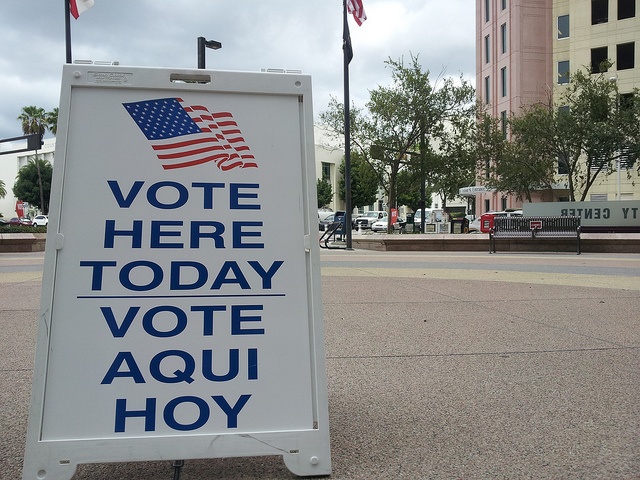The major presidential candidates on voting rights

The 2016 presidential contest is the first since the U.S. Supreme Court gutted the Voting Rights Act, which protects voters against racial discrimination. While the two Democratic candidates have demonstrated firm support for expanded access to the polls, most Republican presidential hopefuls have endorsed policies that make it more difficult for Americans to cast their ballots. (Photo by "Jon" on Flickr.)
Next week, the seven remaining Democratic and Republican presidential candidates will face off in their respective party primaries and caucuses on Super Tuesday. Of all days during the primaries, March 1 is the one with the most delegates on the line as voters and caucus-goers in 12 states* — including six in the South — will select their picks for each party's nominee.
Of the Super Tuesday states, Alabama, Alaska, Georgia, Texas, and Virginia were formerly covered by a provision of the Voting Rights Act of 1965 requiring states and counties with a history of voter discrimination to get federal approval for any changes to voting laws. But in the 2012 Shelby County v. Holder case out of Alabama, the U.S. Supreme Court effectively invalidated the preclearance provision.
Immediately following the Shelby ruling, states such as Texas and North Carolina passed laws that made it harder for people to vote. Some of those laws have been challenged under the existing provisions of the Voting Rights Act. For example, a federal court ruled last year that Texas' voter ID law was racially discriminatory and violated the act, and a similar case against North Carolina's voter ID law is making its way through the courts. Another case challenging Virginia's voter ID law went to trial this week in federal court.
In the first presidential contest since the Voting Rights Act was diminished, only some candidates have made clear statements on voting rights. While the two Democratic candidates have demonstrated firm support for expanded access to the polls, most Republican presidential hopefuls have endorsed policies that make it more difficult for Americans to cast their ballots.
First, let's examine the Democrats' positions on the issue:
Hillary Clinton: The former U.S. senator and secretary of state has urged Congress to pass the Voting Rights Advancement Act, a measure introduced last year by Rep. Terri Sewell (D-Alabama) that would restore provisions of the Voting Rights Act invalidated by the Supreme Court. The Voting Rights Advancement Act is the stronger of two voting rights restoration bills that have been introduced in the current congressional session.
Clinton is also calling for automatic voter registration for citizens when they turn 18, at least 20 days of early voting in each state, and restored voting rights for convicted felons.
"For every Republican governor working to roll back voting rights, there are Americans determined to keep marching forward," Clinton told a crowd in Alabama last year.
Bernie Sanders: The U.S. senator from Vermont is one of 41 cosponsors of the Voting Rights Advancement Act in his chamber. In addition, Sanders' racial justice platform contains sections on disenfranchisement and "political violence" in which he outlines his support for measures to expand voting access, including ex-felon re-enfranchisement, automatic voter registration, increased early voting hours, and making Election Day a federal holiday. Sanders is also the only presidential candidate to sign Greenpeace's Fix Democracy Pledge, which includes a commitment to "defend[ing] the right to vote for all."
Sanders has excoriated Republicans for making voting more difficult, calling their voter suppression cowardly and un-American. "If they can't face a free election they should get another job," he told MSNBC host Rachel Maddow.
The five Republicans remaining in the race present a stark contrast to the Democrats when it comes to voting rights: Not one GOP candidate even mentions the issue on his campaign website, and none have called for restoring the sections of the Voting Rights Act struck down by the Supreme Court.
Ben Carson: Though the retired neurosurgeon hasn't called for restoring the weakened Voting Rights Act, he has said he supports reauthorizing the law, saying he doesn't "see the disadvantage in maintaining" it.
Ted Cruz: The U.S. senator from Texas called for the repeal of the Voting Rights Act's preclearance provision in 2012 and praised the Supreme Court's Shelby decision. A strong proponent of voter ID laws to prevent alleged voter fraud, Cruz even proposed an amendment to an immigration bill that would have allowed states to require proof of citizenship for people trying to vote in federal elections.
John Kasich: As governor of Ohio, Kasich signed legislation that restricted early voting and eliminated same-day registration; it also made voter purges easier, provisional ballots less likely to be counted, and absentee ballots harder to obtain. The Cleveland Plain-Dealer wrote that some of these bills constitute "a breathtaking bid to suppress voting."
Marco Rubio: The U.S. senator from Florida has supported voter ID laws and voted to cut Florida's early voting hours. He also supported GOP Gov. Rick Scott's controversial 2012 voter purge.
Donald Trump: The billionaire frontrunner has said little about voting rights, but he's certain voter fraud is a big problem. "This voting system is out of control," he told supporters. "You have people, in my opinion, that are voting many, many times."
*Democrats will vote or caucus in Alabama, Arkansas, Georgia, Massachusetts, Minnesota, Oklahoma, Tennessee, Texas, Vermont, and Virginia, as well as American Samoa. In Colorado, Democrats hold a straw poll. Republicans will participate in the same states except for Colorado, will not assign delegates from American Samoa, and there will be a Republican caucus in Alaska.
Tags
Alex Kotch
Alex is an investigative journalist based in Brooklyn, New York, and a reporter for the money-in-politics website Sludge. He was on staff at the Institute for Southern Studies from 2014 to 2016. Additional stories of Alex's have appeared in the International Business Times, The Nation and Vice.com.
